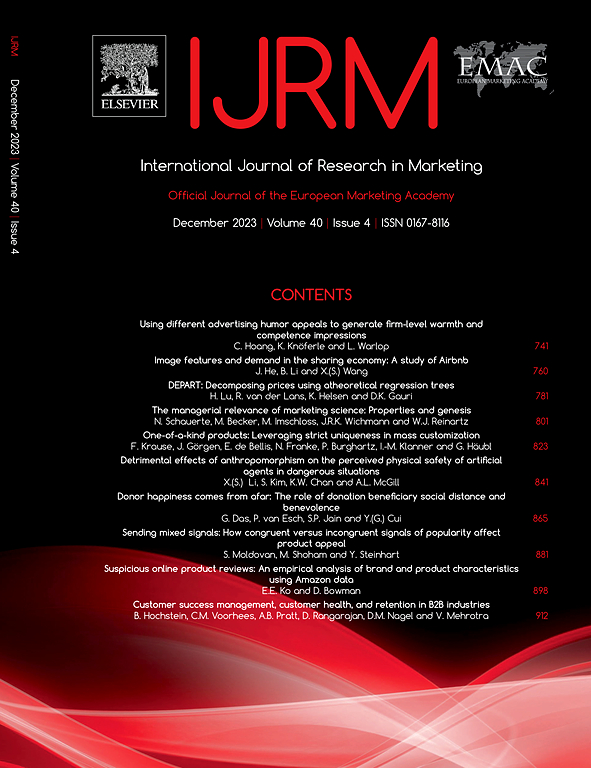党派重于产品:人们夸大政治线索对他人消费偏好的影响
IF 7.5
2区 管理学
Q1 BUSINESS
International Journal of Research in Marketing
Pub Date : 2025-03-01
DOI:10.1016/j.ijresmar.2024.07.007
引用次数: 0
摘要
消费者经常会面对与政治暗示相关的产品。例如,一家咖啡公司可能会吹嘘其与员工或供应商的自由关系,或者在浴室里悬挂承诺取悦自由主义者的标志。在这项研究中,我们证明了消费者高估了这些党派线索对他人偏好的影响程度,我们将这种模式称为 "偏好极化"。我们在五项研究中证明了夸大的偏好极化现象,并表明这种现象在各种常见的消费场景中都很稳定。以前的研究表明,人们经常会高估他人的党派倾向,而本研究则表明,人们会高估党派线索对其他消费者偏好的影响。本研究发现了政治两极化影响消费行为的一种新方式,尤其是对人际决策的影响,从而为相关文献做出了贡献。这项工作对企业也有重要意义,因为企业应该认识到,人们在为他人做选择时会对政治信号做出更积极的反应。我们将在总论中讨论进一步的贡献和未来的研究方向。本文章由计算机程序翻译,如有差异,请以英文原文为准。
Party over product: People exaggerate the influence of political cues on others’ consumption preferences
Consumers often confront offerings that are associated with political cues. For example, a coffee company may tout its liberal relations with employees or suppliers, or may hang bathroom signs that promise to please liberals. In this research, we demonstrate that consumers overestimate how much these partisan cues influence others’ preferences, a pattern we term exaggerated preference polarization. We demonstrate exaggerated preference polarization in five studies, and show that it is robust across a variety of common consumption scenarios. While prior research demonstrates that people often overestimate others’ partisanship, the present research demonstrates that people overestimate the influence of partisan cues on other consumers’ preferences. This research contributes to the literature by identifying a novel way in which political polarization influences consumption behavior, especially for interpersonal decision making. This work also has important implications for firms, who should recognize that people will be more responsive to political signals when choosing for others. We discuss further contributions and directions for future research in the general discussion.
求助全文
通过发布文献求助,成功后即可免费获取论文全文。
去求助
来源期刊
CiteScore
11.80
自引率
4.30%
发文量
77
审稿时长
66 days
期刊介绍:
The International Journal of Research in Marketing is an international, double-blind peer-reviewed journal for marketing academics and practitioners. Building on a great tradition of global marketing scholarship, IJRM aims to contribute substantially to the field of marketing research by providing a high-quality medium for the dissemination of new marketing knowledge and methods. Among IJRM targeted audience are marketing scholars, practitioners (e.g., marketing research and consulting professionals) and other interested groups and individuals.

 求助内容:
求助内容: 应助结果提醒方式:
应助结果提醒方式:


